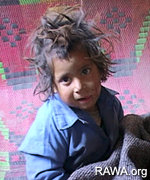WASHINGTON, Feb 25: US efforts to stabilise Afghanistan are 'misguided' and have contributed to growing unease among the population, says a report prepared by a Washington think-tank and funded partly by a US government agency.
The report notes that Afghans are beginning to disengage from national governing processes and lose confidence in their leadership. "Dramatic changes are required in the coming weeks, or 2007 will become the breaking point."

"Afghanistan has received 12 billion $ in aid but there aren't any signs of serious reconstruction. Our people have not benefited from the billions of reconstruction dollars due to theft by the warlords or misuse by NGOs. Even a fraction of this aid has not been used for the benefit and welfare of our people. Government corruption and fraud directs billions of dollars into the pockets of high-ranking officials. It is such a big shame that the government still cannot provide electricity, food and water for its people."
Zoya's Speech, Oct.7, 2006
The report based in part on 1,000 interviews with ordinary Afghans notes that conditions in Afghanistan have deteriorated markedly since 2005.
"Since then, conditions in Afghanistan have deteriorated into the 'danger zone'," warns the report titled "Breaking Point: Measuring Progress in Afghanistan."
"Afghan ability to meet needs and interests has not improved since 2005, despite more money spent, more projects implemented, and more time passed."
The report, by the non-partisan Centre for Strategic and International Studies and funded in part by the US Agency for International Development, underlines violence and government corruption as two major concerns of ordinary Afghans.
"The government and social institutions are perceived as being less legitimate and less prepared to meet Afghan needs today and in the future. All pillars, save economic conditions, have fallen into the danger zone. Security has shown the sharpest decline, with justice still the worst performing pillar," says the report.
The report also points out some bright spots, noting that there has been an overall improvement in the national economy and Afghan women now enjoy more rights than they did ever before.
Ordinary Afghans interviewed for this report, described diminishing security as their number one concerns, complaining that a sudden increase in Taliban attacks has further increased their sense of insecurity.
The authors found that Afghans tend to be more negative in their outlook than official statistics or media accounts would suggest.
"Security has sharply deteriorated in all regions. Afghans are more insecure today than they were in 2005. This is due largely to the violence surrounding the insurgency and counter-insurgency campaigns, and the inability of security forces to combat warlords and drug traffickers."
The authors note that state security institutions have increased their operational capacity and have trained more personnel, "but they -- particularly the Afghan National Police -- have had problems with retention, staff effectiveness, corruption and general oversight."




